|
|
|
Sort Order |
|
|
|
Items / Page
|
|
|
|
|
|
|
| Srl | Item |
| 1 |
ID:
107911
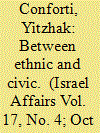

|
|
|
|
|
| Publication |
2011.
|
| Summary/Abstract |
This article addresses two basic issues of the Zionist vision: 1. Was the Jewish state planned as an ethnic or civic state? 2. What was the character of the Zionist vision? Was it a holistic utopian vision, or a minimalist vision for creating a Jewish national state? This research concludes that the state of Israel, which developed from a nationalist ethnic-cultural movement, integrated within it ethnic values as well as Western civic values. The founders of the central wing of the movement all aspired to create a Jewish national state that upheld these values. Furthermore, the planning of the Zionist Utopia by the central group of the Zionist leadership was usually realistic and minimalist, not holistic. This position enabled the leadership to strike a balance between vision and reality, and to address the historical circumstances on the path toward establishment of the state.
|
|
|
|
|
|
|
|
|
|
|
|
|
|
|
|
| 2 |
ID:
138591
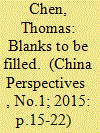

|
|
|
|
|
| Summary/Abstract |
Jia Pingwa’s Decadent Capital was wildly popular upon its publication in 1993. Offering plenty of sex and a bleak view of Chinese society under reform, it was also highly controversial, not least because of the blank squares strewn throughout the text to represent erotic descriptions edited out by the author. Commentators accused Jia of selling out high culture, much like the intellectuals portrayed in the narrative. The novel was banned in 1994 but rereleased in 2009 with one major change: the blank squares were replaced by ellipses. I argue that these blank squares not only make public censorship itself but also constitute the space of alternative publics, whether harking back to an elided past or projecting into a future yet to be written, that the post-Tiananmen Party-state tries to nullify. KEYWORDS: Jia Pingwa, censorship, publishing industry, postsocialism, dystopia, utopia, Tiananmen Square, public, criticism, Lu Xun.
|
|
|
|
|
|
|
|
|
|
|
|
|
|
|
|
| 3 |
ID:
183442
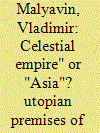

|
|
|
|
|
| Summary/Abstract |
This article deals with the philosophical foundations and historical consequences of two influential political concepts in the Far East: New Celestial Empire and Asia as Method. The author shows that politics in the Far East have been traditionally based on the categories of the Void and Transformation, which gave rise to a specific type of Utopian consciousness with its motif of universal co-being within the encompassing yet singular event. The New Celestial Empire concept reflects global aspirations of the PRC, taking into consideration local specifics. The concept of Asia as Method aims at decolonization and deimperialization in the Commonwealth of Independent States (CIS) and is popular in Japan, South Korea, Taiwan, and Hong Kong. The author examines the confrontation between these theories and suggests ways for their possible integration.
|
|
|
|
|
|
|
|
|
|
|
|
|
|
|
|
| 4 |
ID:
111800
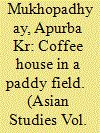

|
|
|
| 5 |
ID:
085892
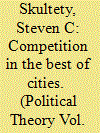

|
|
|
|
|
| Publication |
2009.
|
| Summary/Abstract |
By examining his account of individual virtues, making inferences from his analyses of flawed cities, and teasing out the tacit assumptions behind claims about the nature of political activity, I argue that Aristotle thinks of competition as being a political ideal rather than as an inevitable corruption of civic life. Virtuous citizens compete for civic honor through traditional "competitive outlays" and contend against one another for prestigious offices in the city. Moreover, I argue that the very structure of political deliberation is competitive. It is through a "vis-à-vis" competition among proposals that a winning policy is adopted, and the speakers who offer these proposals are themselves involved in a competition for political influence.
|
|
|
|
|
|
|
|
|
|
|
|
|
|
|
|
| 6 |
ID:
158426
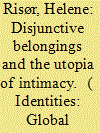

|
|
|
|
|
| Summary/Abstract |
The paper analyses practices of intimacy among youth in a poor, crime-ridden neighbourhood of Santiago. It argues that their sense of belonging to their neighbourhood and broader society is disjunctive: they inhabit the nation-state without complying with expectations of proper citizenship. Similarly, they dwell in their neighbourhood without identifying with it. Instead, they turn to intimate relations with friends and lovers as spaces of belonging. Through these often failing relationships, they pursue emotional and socio-economic stability and seek to fulfil expectations of social becoming and mobility. These intimate and romantic practices can both be understood as an utopian, affective promise that allows for imagining possibilities of a good life and as a moral exercise in the realisation of an adjacent self and we argue that intimacy constitutes a key site in the quest for social belonging among subaltern youth in neoliberal Chile.
|
|
|
|
|
|
|
|
|
|
|
|
|
|
|
|
| 7 |
ID:
160102
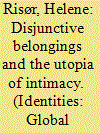

|
|
|
|
|
| Summary/Abstract |
The paper analyses practices of intimacy among youth in a poor, crime-ridden neighbourhood of Santiago. It argues that their sense of belonging to their neighbourhood and broader society is disjunctive: they inhabit the nation-state without complying with expectations of proper citizenship. Similarly, they dwell in their neighbourhood without identifying with it. Instead, they turn to intimate relations with friends and lovers as spaces of belonging. Through these often failing relationships, they pursue emotional and socio-economic stability and seek to fulfil expectations of social becoming and mobility. These intimate and romantic practices can both be understood as an utopian, affective promise that allows for imagining possibilities of a good life and as a moral exercise in the realisation of an adjacent self and we argue that intimacy constitutes a key site in the quest for social belonging among subaltern youth in neoliberal Chile.
|
|
|
|
|
|
|
|
|
|
|
|
|
|
|
|
| 8 |
ID:
158424
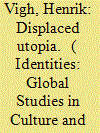

|
|
|
|
|
| Summary/Abstract |
This article looks at the subjectivities of disenfranchised urban men in Bissau, the capital of Guinea-Bissau. Taking its point of departure in an illumination of the ‘thrown’ character of subjectivity, it clarifies the social positions and futures that life in the city is seen to afford. As the city has been caught in a prolonged period of conflict and decline, the retrenchment of the state, economy and social networks has created a setting where people struggle to achieve positive social presence and brighter prospects. The article shows how subjectivities in such situations can become tied to a sense of depreciation and downward mobility. In doing so, it illuminates some of the more common features of social exclusion that affect the urban poor and shows how the processes of decay and deterioration that peoples’ lives are caught in may create a longing for better futures and worthy social emplacement. They spur a striving for socially appreciated being that is imagined as elusively attainable through migration.
|
|
|
|
|
|
|
|
|
|
|
|
|
|
|
|
| 9 |
ID:
160100
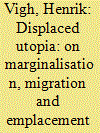

|
|
|
|
|
| Summary/Abstract |
This article looks at the subjectivities of disenfranchised urban men in Bissau, the capital of Guinea-Bissau. Taking its point of departure in an illumination of the ‘thrown’ character of subjectivity, it clarifies the social positions and futures that life in the city is seen to afford. As the city has been caught in a prolonged period of conflict and decline, the retrenchment of the state, economy and social networks has created a setting where people struggle to achieve positive social presence and brighter prospects. The article shows how subjectivities in such situations can become tied to a sense of depreciation and downward mobility. In doing so, it illuminates some of the more common features of social exclusion that affect the urban poor and shows how the processes of decay and deterioration that peoples’ lives are caught in may create a longing for better futures and worthy social emplacement. They spur a striving for socially appreciated being that is imagined as elusively attainable through migration.
|
|
|
|
|
|
|
|
|
|
|
|
|
|
|
|
| 10 |
ID:
160098
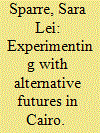

|
|
|
|
|
| Summary/Abstract |
This article investigates young middle-class Egyptians’ engagement with the religious and national visions of Resala, Egypt’s largest Muslim youth NGO, and how they come to rethink themselves existentially and politically through this commitment, in the context of the 2011 uprising and its aftermath. I show how their volunteering through Resala, shaped by specific sociopolitical circumstances, paved the way for personal hopes to develop into utopian aspirations. Demonstrating the dynamic relationship between the formation of political subjectivities and how utopias emerge, develop and are sometimes shattered, I argue that while utopic aspirations continue to characterise parts of Egypt’s 2011 youth generation, for others, such aspirations have to give way for other more personal concerns to establish a secure adult life. Therefore, activism and experiments with societal alternatives in contexts like the Egyptian continue to depend on inclusive and less risky spaces for civic engagement outside formal politics and institutions.
|
|
|
|
|
|
|
|
|
|
|
|
|
|
|
|
| 11 |
ID:
158422
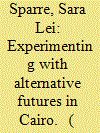

|
|
|
|
|
| Summary/Abstract |
This article investigates young middle-class Egyptians’ engagement with the religious and national visions of Resala, Egypt’s largest Muslim youth NGO, and how they come to rethink themselves existentially and politically through this commitment, in the context of the 2011 uprising and its aftermath. I show how their volunteering through Resala, shaped by specific sociopolitical circumstances, paved the way for personal hopes to develop into utopian aspirations. Demonstrating the dynamic relationship between the formation of political subjectivities and how utopias emerge, develop and are sometimes shattered, I argue that while utopic aspirations continue to characterise parts of Egypt’s 2011 youth generation, for others, such aspirations have to give way for other more personal concerns to establish a secure adult life. Therefore, activism and experiments with societal alternatives in contexts like the Egyptian continue to depend on inclusive and less risky spaces for civic engagement outside formal politics and institutions.
|
|
|
|
|
|
|
|
|
|
|
|
|
|
|
|
| 12 |
ID:
100590
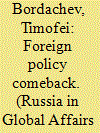

|
|
|
| 13 |
ID:
090299
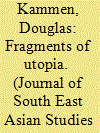

|
|
|
|
|
| Publication |
2009.
|
| Summary/Abstract |
Six months after the historic August 1999 referendum in which the people of East Timor voted to reject Indonesia's offer of broad autonomy, the newly appointed chief of the United Nations Transitional Administration in East Timor, Sérgio Vieira de Mello, commented to CNN on the enormous challenge of setting the territory on the road to independence: 'It is a test case, therefore it is even a laboratory case where we can transform utopia into reality. But I think we can try and get it right in the case of Timor.' After 24 years of brutal military occupation, the suggestion that East Timor was to be a laboratory case for the United Nations might have seemed insulting, the notion of utopia absurd. Hundreds of thousands of people were without housing. Basic infrastructure lay in ruins. Commodities were scarce and those goods available were sold at grossly inflated prices. Eleven thousand foreign troops had arrived to restore security. Tens of thousands of refugees were still living in squalid camps across the border in Indonesian West Timor, many against their will. Nevertheless, Vieira de Mello's statement neatly captured the twin aspirations of the time - the independence long-dreamed of by East Timorese and the opportunity for the United Nations literally to build a state from the ground up. In the same CNN report, East Timorese Nobel Laureate José Ramos-Horta emphasised precisely this point: 'This is the first instance in the history of the UN that the UN has managed completely an entire country; and they have a [Timorese pro-independence] movement that is very cooperative, they have an exceptional people that's cooperating with them, so they cannot fail. They are condemned to succeed because failure would be disastrous for the credibility of the UN, so they simply cannot afford to fail.' Utopia, it seems, had become a necessity.
|
|
|
|
|
|
|
|
|
|
|
|
|
|
|
|
| 14 |
ID:
152442
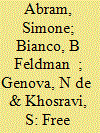

|
|
|
|
|
| Summary/Abstract |
This article contains the text and discussion of a debate held at the IUAES World Congress in Anthropology at Manchester University in 2013. The motion was proposed by Bela Feldman-Bianco (State University of Campinas), seconded by Noel Salazar (University of Leuven) and was opposed by Shahram Khosravi (Stockholm University), seconded by Nicholas de Genova (then at Goldsmiths’ College). The debate was chaired by Simone Abram (Durham University).
|
|
|
|
|
|
|
|
|
|
|
|
|
|
|
|
| 15 |
ID:
167208


|
|
|
|
|
| Summary/Abstract |
Human rights have been in the practice of international relations, but they have not been central to academic thinking on International Relations (IR) for most of the century since the discipline became institutionalized in 1919. We suggest two related reasons for this relative neglect by the IR community. First, the US heartland of IR prioritized other institutions of international order during the 1950s and 1960s, primarily the balance of power, diplomacy, and arms control. Second, human rights were treated with suspicion by realists in particular given their view that morality in foreign policy was potentially disruptive of international order. If the emergent discipline of IR largely ignored the 1948 Universal Declaration of Human Rights, so did the rest of the world according to the revisionist history of human rights offered by Samuel Moyn. He challenges the idea that the birth of the regime was the culmination of a 150-year struggle that began in the minds of Enlightenment thinkers and ended with a new globalized framework of rights for all. While IR was slow to come to human rights, the pace in the last three decades has quickened considerably; the area of protecting the basic right of security from violence being a case in point, where several IR scholars have been pivotal in the development of action-guiding theory. Developing a critical theme in Carr’s The Twenty Years’ Crisis 1919-1939, we consider whether these institutional developments represent great illusions or great transformations in international relations in Carr’s terms.
|
|
|
|
|
|
|
|
|
|
|
|
|
|
|
|
| 16 |
ID:
192982
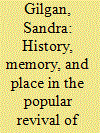

|
|
|
|
|
| Summary/Abstract |
In the first decade of the twenty-first century, traditional Confucian education re-emerged in China in the context of so-called study halls and academies. The goal of the parents, teachers, and headmasters associated with them is to cultivate modern virtuous persons through an approach called “classics-reading education.” Even though they allude to deep historical roots, these contemporary facilities are novel (re)creations, developed in response to current needs. This article examines the classics-reading movement under the theoretical lens of infrastructures of memory to illustrate the roles of memory and the perception of the past in the current making of “traditional” education and educational sites. Memories of and references to the past inform people's visions of a better future that is to be achieved through their tradition-related educational practices. Making a connection with the past through memory aims at stability in the face of future uncertainty.
|
|
|
|
|
|
|
|
|
|
|
|
|
|
|
|
| 17 |
ID:
054246
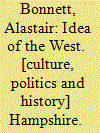

|
|
|
|
|
| Publication |
Hampshire, Palgrave Macmillan, 2004.
|
| Description |
x, 201p.Pbk
|
| Standard Number |
1403900353
|
|
|
|
|
|
|
|
|
|
|
|
Copies: C:1/I:0,R:0,Q:0
Circulation
| Accession# | Call# | Current Location | Status | Policy | Location |
| 048754 | 909.0982/BON 048754 | Main | On Shelf | General | |
|
|
|
|
| 18 |
ID:
110047
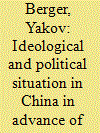

|
|
|
|
|
| Publication |
2011.
|
| Summary/Abstract |
As the 18th congress of the CPC, which is supposed to renovate the leadership of the ruling party and adopt programmatic directives on the crucial questions of the country's development for the period up to 2020, is drawing closer, a dialogue and confrontation between various ideological and political groups (both between themselves and with central power and various groupings within it) tend to intensify. The left-wing forces and their liberal or social-democratic opponents take an active part in rivalry.
|
|
|
|
|
|
|
|
|
|
|
|
|
|
|
|
| 19 |
ID:
160099
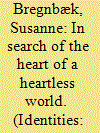

|
|
|
|
|
| Summary/Abstract |
In this article I shed light on the phenomenon of Chinese young people’s conversion to Christianity and argue that it is often closely tied to a utopian longing for what is missing in their lives (Bloch 1907). Through a person-centered account of two young people, I explore their quests to escape the temporal predicament of endless striving 'fuzao' and search for a better life based autotelic values abroad. Paraphrasing Marx I argue that they are in search of ‘the heart of a heartless world’ and argue that they can be seen as individual quests to find hope through more fulfilling forms of human sociality. Arguing that human experience is transitory and illusory in the same way that selves are not stable bounded entities but rather multiple and unstable, I argue that utopia is never fully achieved since it is essentially ‘no-where’.
|
|
|
|
|
|
|
|
|
|
|
|
|
|
|
|
| 20 |
ID:
158423
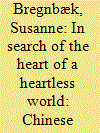

|
|
|
|
|
| Summary/Abstract |
In this article I shed light on the phenomenon of Chinese young people’s conversion to Christianity and argue that it is often closely tied to a utopian longing for what is missing in their lives (Bloch 1907). Through a person-centered account of two young people, I explore their quests to escape the temporal predicament of endless striving 'fuzao' and search for a better life based autotelic values abroad. Paraphrasing Marx I argue that they are in search of ‘the heart of a heartless world’ and argue that they can be seen as individual quests to find hope through more fulfilling forms of human sociality. Arguing that human experience is transitory and illusory in the same way that selves are not stable bounded entities but rather multiple and unstable, I argue that utopia is never fully achieved since it is essentially ‘no-where’.
|
|
|
|
|
|
|
|
|
|
|
|
|
|
|
|
|
|
|
|
|